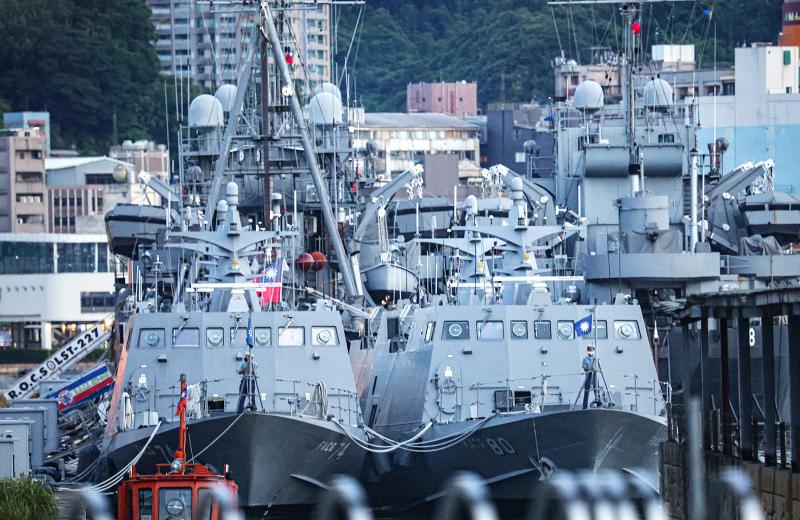The nation should build a class of second-line ships to offset the numerical advantage of Chinese frigates, Democratic Progressive Party Legislator Wang Ting-yu (王定宇) said, referring to disputes that stalled the navy’s next-generation guided missile frigate program.
China continues to probe Taiwan’s sovereign waters, an effort spearheaded by its Type 054 frigates and Type 056 corvettes, he said, adding that the navy faces steep challenges in countering Chinese incursions due to its aging fleet, with most ship types designed during the Cold War.
The Chi Yang-class frigates — formerly operated by the US as Knox-class frigates — are powered by steam turbines that are inferior in power output and safety to the gas turbines modern warships use, he said.

Photo: CNA
Deploying the navy’s biggest warships after Type 056 corvettes to counter the incursions is not a worthwhile effort, he said.
However, Taiwan’s two Tuo Chiang-class corvettes, which have less than 700 tonnes of displacement, are too small for the job, despite their firepower, he said.
If the navy is resolved to carry on with the second-generation frigate program, a next-generation “second-rate” ship class should be created to give the fleet more bulk and perform reconnaissance and patrol missions, he said.
The proposed secondary ship type would be a replacement for the Chi Yang class, which is long overdue, he said.
Last year, the navy said its next-generation guided missile frigate program — which has a budget of NT$24.5 billion (US$816.1 million) — might not be finished by 2026 due to technical challenges.
While the frigates were intended to have advanced reconnaissance and defense capabilities, the navy and the Chungshan Institute of Science and Technology could not agree on the ships’ displacement or internal layout, the navy said.
As the program might have to be redesigned, delays to the program are likely, the navy said.
A source said on condition of anonymity that navy top brass are considering the introduction of a secondary combat ship class with a displacement of about 2,000 tonnes as a temporary measure to increase the fleet’s combat power.

Chinese spouse and influencer Guan Guan’s (關關) residency permit has been revoked for repeatedly posting pro-China videos that threaten national security, the National Immigration Agency confirmed today. Guan Guan has said many controversial statements in her videos posted to Douyin (抖音), including “the red flag will soon be painted all over Taiwan” and “Taiwan is an inseparable part of China,” and expressing hope for expedited reunification. The agency last year received multiple reports alleging that Guan Guan had advocated for armed reunification. After verifying the reports, the agency last month issued a notice requiring her to appear and explain her actions. Guan

GIVE AND TAKE: Blood demand continues to rise each year, while fewer young donors are available due to the nation’s falling birthrate, a doctor said Blood donors can redeem points earned from donations to obtain limited edition Formosan black bear travel mugs, the Kaohsiung Blood Center said yesterday, as it announced a goal of stocking 20,000 units of blood prior to the Lunar New Year. The last month of the lunar year is National Blood Donation Month, when local centers seek to stockpile blood for use during the Lunar New Year holiday. The blood demand in southern Taiwan — including Tainan and Kaohsiung, as well as Chiayi, Pingtung, Penghu and Taitung counties — is about 2,000 units per day, the center said. The donation campaign aims to boost

The Kaohsiung Tourism Bureau audited six hotels in an effort to prevent price gouging ahead of Korean band BTS’ concert tour in the city scheduled for Nov. 19, 21 and 22 this year. The bureau on Friday said that the audits — conducted in response to allegations of unfair pricing posted on social media — found no wrongdoing. These establishments included the local branches of Chateau de Chine, Hotel Nikko, My Humble House, and Grand Hai Lai, it said, adding that the Consumer Protection Commission would have penalized price gougers had the accusations been substantiated. The bureau said the Tourism Development Act

The military yesterday said it has located the flight data recorder, or black box, of an F-16V jet that disappeared off eastern Taiwan earlier this month, and it would soon deploy a salvage team to try to retrieve it. Air Force Command Headquarters said that while it had pinned down the location of the black box, it was still searching for the aircraft’s sole pilot, air force Captain Hsin Po-yi (辛柏毅). Without providing details, the air force said it had located the black box days after detecting some intermittent signals and would now engage a team of professionals to retrieve it. The air